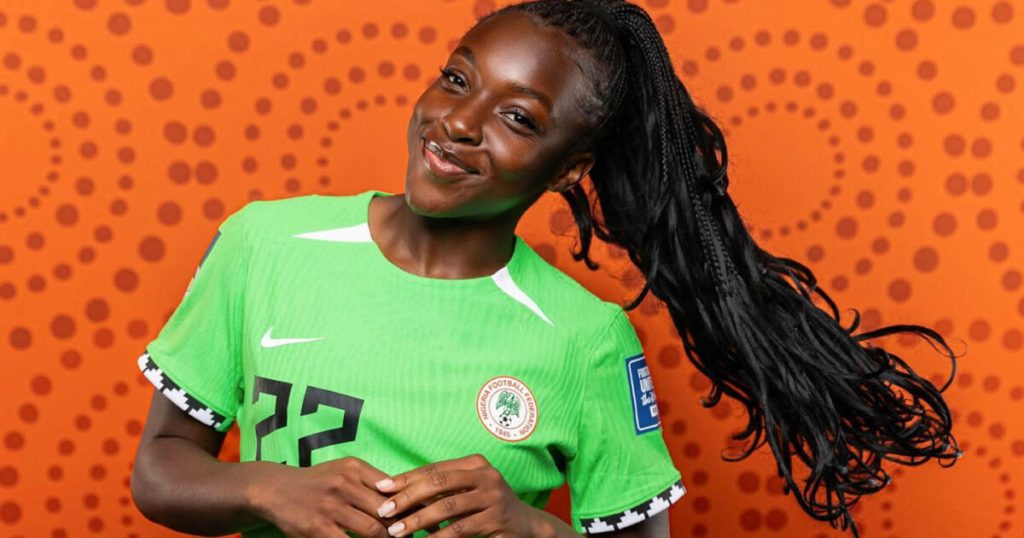The recent exchange between Nigerian international footballer Michelle Alozie and football fans on social media has reignited a crucial conversation about the disparity in support between the men’s and women’s national teams in Nigeria. Alozie, spurred by the overwhelming crowd at a Super Eagles (men’s team) match, questioned the lack of similar enthusiasm for Super Falcons (women’s team) games. Her call for fans to extend their support to the women’s team was met with a mixture of support and pushback, highlighting the complex dynamics surrounding the perception and appreciation of women’s football in Nigeria. This incident underscores a broader global challenge where women’s sports, despite significant achievements, often struggle to attract the same level of attention and financial investment as their male counterparts.
Alozie’s initial appeal for greater fan attendance at Super Falcons matches was met with a dismissive comment suggesting that the women’s team needed to “play better” and have “big names” to attract crowds. This comment sparked a pointed response from Alozie, who highlighted the Super Falcons’ impressive record of ten Women’s Africa Cup of Nations (WAFCON) titles, consistent World Cup qualification, and their status as Africa’s highest-ranked women’s team. She implicitly challenged the notion that the team lacked merit or star power, emphasizing their considerable achievements on the continental and global stage. This exchange immediately polarized opinions online, with some fans rallying behind Alozie and criticizing the dismissive attitude towards the women’s team, while others reiterated the persistent challenges facing women’s sports in terms of revenue generation and audience engagement.
The ensuing debate exposed the underlying tension between acknowledging the Super Falcons’ undeniable success and the prevailing perception that women’s football is inherently less appealing. Many fans voiced their support for Alozie, arguing that the team’s accomplishments deserved greater recognition and fan support. They highlighted the Super Falcons’ status as Nigeria’s most successful national team, surpassing even the Super Eagles in terms of continental trophies. These supporters argued that the players deserved the same level of encouragement and appreciation as their male counterparts, emphasizing that showing up for matches is a fundamental way of demonstrating that support. They challenged the notion that the onus was solely on the women’s team to attract fans, arguing that a cultural shift in perception is also necessary.
However, another segment of the online discussion pointed to the global struggle faced by women’s sports in attracting large crowds and generating substantial revenue. These arguments often centered on the perceived lower level of athleticism and excitement in women’s football compared to the men’s game. This viewpoint reflects a broader challenge faced by women’s sports worldwide, where historical underinvestment and ingrained societal biases have contributed to lower visibility, media coverage, and ultimately, fan interest. While acknowledging the Super Falcons’ achievements, these commentators argued that the economic realities of sports dictate fan engagement and that women’s football needs to overcome these challenges to attract larger crowds.
The Alozie incident highlights the complex interplay of factors influencing the disparity in support for men’s and women’s football. While the Super Falcons boast an impressive record of achievement, they continue to face hurdles in attracting the same level of fan enthusiasm and financial investment as the Super Eagles. This disparity reflects broader societal attitudes towards women’s sports, which often remain undervalued and underappreciated despite significant progress in recent years. The debate sparked by Alozie’s comments underscores the need for a multi-pronged approach to address this imbalance, including increased media coverage, greater investment in women’s football, and a concerted effort to challenge ingrained gender biases that hinder the growth and recognition of women’s sports.
Ultimately, the conversation ignited by Michelle Alozie’s social media post serves as a valuable opportunity to address the challenges faced by women’s football in Nigeria and beyond. It highlights the need for a collective effort to create a more equitable sporting landscape where female athletes receive the recognition, support, and investment they deserve. Addressing the root causes of the disparity in fan engagement is crucial for the continued growth and development of women’s football. This includes challenging ingrained biases, promoting greater visibility for women’s sports, and fostering a culture of appreciation for the athleticism and achievements of female athletes. The ongoing debate serves as a reminder that achieving true equality in sports requires a comprehensive and sustained effort from fans, media, sponsors, and sporting bodies alike.














